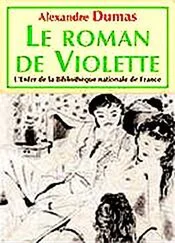“Sire,” said Coligny, “we must conquer first, and then take counsel after the victory.”
“That is your advice — so be it; Monday you shall leave for Flanders, and I for Amboise.”
“Your Majesty leaves Paris, then?”
“Yes; I am weary of this confusion, and of these fêtes. I am not a man of action; I am a dreamer. I was not born to be a king; I was born to be a poet. You shall form a council which shall govern while you are at war, and provided my mother is not in it, all will go well. I have already sent word to Ronsard to join me; and yonder, we two together, far from all tumult, far from the world, far from evil men, under our mighty trees on the banks of the river, with the murmur of brooks in our ears, will talk about divine things, the only compensation which there is in the world for the affairs of men. Wait! Hear these lines in which I invite him to join me; I wrote them this morning.”
Coligny smiled. Charles IX. rubbed his hand over his brow, yellow and shining like ivory, and repeated in a kind of sing-song the following couplets:
“Ronsard, I am full sure that if you see me not,
Your great King’s voice by you will shortly be forgot.
But as a slight reminder — know I still persevere
In making skill of poesy my sole endeavor.
And that is why I send to you this warm appeal,
To fill your mind with new, enthusiastic zeal.
“No longer then amuse yourself with home distractions;
Past is the time for gardening and its attractions.
Come, follow with your King, who loves you most of all,
For that the sweet strong verses from your lips do fall.
And if Ardoise shall not behold you shortly present,
A mighty quarrel will break out and prove unpleasant!”
“Bravo! sire, bravo!” cried Coligny, “I am better versed in matters of war than in matters of poetry, but it seems to me that those lines are equal to the best, even written by Ronsard, or Dorat, or even Michel de l’Hôpital, Chancellor of France.”
“Ah! my father!” exclaimed Charles IX.; “would what you said were true! For the title of poet, you see, is what I am ambitious, above all things, to gain; and as I said a few days ago to my master in poetry:
“‘The art of making verse, if one were criticised,
Should ever be above the art of reigning prized.
The crowns that you and I upon our brows are wearing,
I as the King receive, as poet you are sharing.
Your lofty soul, enkindled by celestial beams,
Flames of itself, while mine with borrowed glory gleams.
If ‘mid the gods I ask which has the better showing,
Ronsard is their delight: I, but their image glowing.
Your lyre, which ravishes with sounds so sweet and bold,
Subdues men’s minds, while I their bodies only hold!
It makes you master, lifts you into lofty regions,
Where even the haughty tyrant ne’er dared claim allegiance.’”
“Sire,” said Coligny, “I was well aware that your Majesty conversed with the Muses, but I did not know that you were their chief counsellor.”
“After you, my father, after you. And in order that I may not be disturbed in my relations with them, I wish to put you at the head of everything. So listen: I must now go and reply to a new madrigal my dear and illustrious poet has sent me. I cannot, therefore, give you the documents necessary to make you acquainted with the question now debating between Philip II. and myself. There is, besides, a plan of the campaign drawn up by my ministers. I will find it all for you, and give it to you tomorrow.”
“At what time, sire?”
“At ten o’clock; and if by chance I am busy making verses, or in my cabinet writing, well — you will come in just the same, and take all the papers which you will find on the table in this red portfolio. The color is remarkable, and you cannot mistake it. I am now going to write to Ronsard.”
“Adieu, sire!”
“Adieu, my father!”
“Your hand?”
“What, my hand? In my arms, in my heart, there is your place! Come, my old soldier, come!”
And Charles IX., drawing Coligny toward him as he bowed, pressed his lips to his white hair.
The admiral left the room, wiping away a tear.
Charles IX. followed him with his eyes as long as he could see, and listened as long as he could catch a sound; then, when he could no longer hear or see anything, he bent his head over toward his shoulder, as his custom was, and slowly entered his armory.
This armory was the king’s favorite apartment; there he took his fencing-lessons with Pompée, and his poetry lessons with Ronsard. He had gathered there a great collection of the most costly weapons he had been able to find. The walls were hung with axes, shields, spears, halberds, pistols, and muskets, and that day a famous armorer had brought him a magnificent arquebuse, on the barrel of which were inlaid in silver these four lines, composed by the royal poet himself:
“ Pour maintenir la foy, Je suis belle et fidèle. Aux ennemis du Roi, Je suis belle et cruelle. ” 1
Charles, as we have said, entered this room, and after having shut the door by which he had entered, he raised the tapestry that masked a passage leading into a little chamber, where a woman kneeling before a priedieu was saying her prayers.
As this movement was executed noiselessly, and the footsteps of the king, deadened by the thick carpet, made no more noise than a phantom’s, the kneeling woman heard no sound, and continued to pray. Charles stood for a moment pensively looking at her.
She was a woman of thirty-four or thirty-five years of age, whose vigorous beauty was set off by the costume of the peasants of Caux. She wore the high cap so much the fashion at the court of France during the time of Isabel of Bavaria, and her red bodice was embroidered with gold, like those of the contadine of Nettuno and Sora. The apartment which she had for nearly twenty years occupied was close to the King’s bed-chamber and presented a singular mixture of elegance and rusticity. In equal measure the palace had encroached upon the cottage, and the cottage upon the palace, so that the room combined the simplicity of the peasant woman and the luxury of the court lady.
The priedieu on which she knelt was of oak, marvellously carved, covered with velvet and with gold fringes, while the Bible from which she was reading (for she was of the reformed religion) was very old and torn, like those found in the poorest cottages; now everything in the room was typified by the priedieu and the Bible.
“Eh, Madelon!” said the King.
The kneeling woman lifted her head smilingly at the well-known voice, and rising from her knees —
“Ah! it is you, my son,” said she.
“Yes, nurse; come here.”
Charles IX. let fall the curtain, and sat down on the arm of an easy-chair. The nurse appeared.
“What do you want with me, Charlot?”
“Come near, and answer in a low tone.”
The nurse approached him with a familiarity such as might come from that maternal affection felt by a woman for her nursling, but attributed by the pamphlets of the time to a source infinitely less pure.
“Here I am,” said she; “speak!”
“Is the man I sent for come?”
“He has been here half an hour.”
Charles rose, approached the window, looked to assure himself there were no eavesdroppers, went to the door and looked out there also, shook the dust from his trophies of arms, patted a large greyhound which followed him wherever he went, stopping when he stopped and moving when he moved — then returning to his nurse:
“Very well, nurse, let him come in,” said he.
The worthy woman disappeared by the same passage by which she had entered, while the king went and leaned against a table on which were scattered arms of every kind.
Читать дальше












